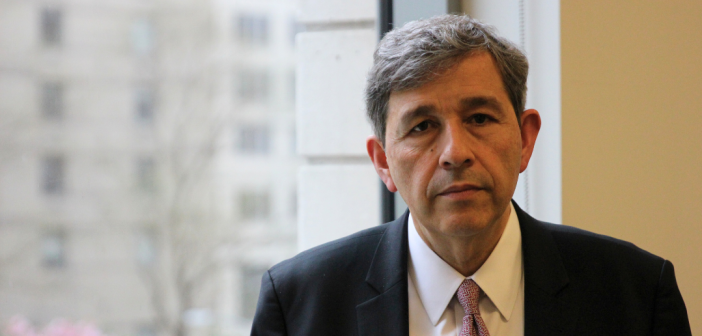Colombia’s former Chief Justice Manuel José Cepeda Espinosa has traded handing down rulings in landmark constitutional cases in court and spent this semester teaching Fordham Law students.
“It’s been a great pleasure to have the space to rethink about so many issues that I had to tackle when I was a judge and to communicate my perspective on issues I had once worked on,” said Cepeda.
Sixteen students have benefited from the expertise of Cepeda, who was a member of the Constitutional Court for the 2001-2009 term, in his role as William Hughes Mulligan Distinguished Visiting Professor of Law at Fordham Law this semester.
“It has been fascinating to learn from Justice Cepeda this semester,” said Sonia Montejano ’24. “There is so much to glean from how other countries’ high courts interpret their founding texts, develop individual rights and tackle institutional concerns to live up to democratic ideals. The comparative references we studied in this course will undoubtedly make us better lawyers and legal thinkers.”
Added classmate Greta Kaufman ’24, “I feel so privileged to have the opportunity to learn from someone like Justice Cepeda, who has such a depth of knowledge and experience in navigating these complicated issues. Justice Cepeda has done an incredible job selecting the kinds of cases that highlight tensions in the values underlying constitutional law across multiple societies that are both timely and timeless. After more than two years of learning about the Anglo-American legal tradition it has been so refreshing to learn about these issues from a non-Western lens.”

Students in “Comparative Constitutional Law” discuss the role of constitutional judges in democratic systems with Colombia’s former Chief Justice Manuel José Cepeda Espinosa.
At Fordham Law, Cepeda has been teaching Comparative Constitutional Law, a course that focuses on issues that have attracted the attention of constitutional lawyers and judges around the world, over the last 50 years—including freedom of expression, social welfare rights, and executive power during emergencies, among others. It also examines complex problems of constitutional adjudication in the United States in comparison to Colombia, Germany, and South Africa.
“My goal was to test how new and different approaches to constitutional law would be received by the students based on their reactions … because we’re speaking about things that aren’t common in the context of American constitutional law,” Cepeda said. “The students have been wonderful. They work hard and participate, and I think they like seeing what’s going on in different countries.”
Thirty years ago, Cepeda served as the presidential advisor for the Constituent Assembly of Colombia, preparing the articles that expanded the protection of dignity, liberty, and equality with a bill of rights in Colombia’s Draft Constitution. His main contributions relate to the creation of the Constitutional Court and the Ombudsman, the writ of tutela, participatory democracy, and amendment procedures.
After retiring from the Court, Cepeda was part of the transitional justice group of experts that negotiated the peace agreement with the FARC guerrilla in 2015. From 2013 to 2022, he was one of the agents of Colombia before the International Court of Justice in two delimitation cases initiated by Nicaragua against Colombia.
At Fordham, he spent the first half of the semester examining constitutions’ origins and functions, constitutional interpretation, basic civil rights, and inequalities of rights, then transitioned into teaching about executive powers, amendments, relationships between the Constitution and international treaties, and the role of constitutional judges in democracies. Each class, according to Cepeda, has generated robust conversations and student papers that explore topical issues, including abortion and the role, powers, and limitations of constitutional judges in democratic systems.
Although his visiting professorship concludes on April 26, Cepeda said that living in New York City has been a “fantastic experience, “It’s a wonderful and stimulating city, and I love experiencing all the seasons … even when it snows.”




